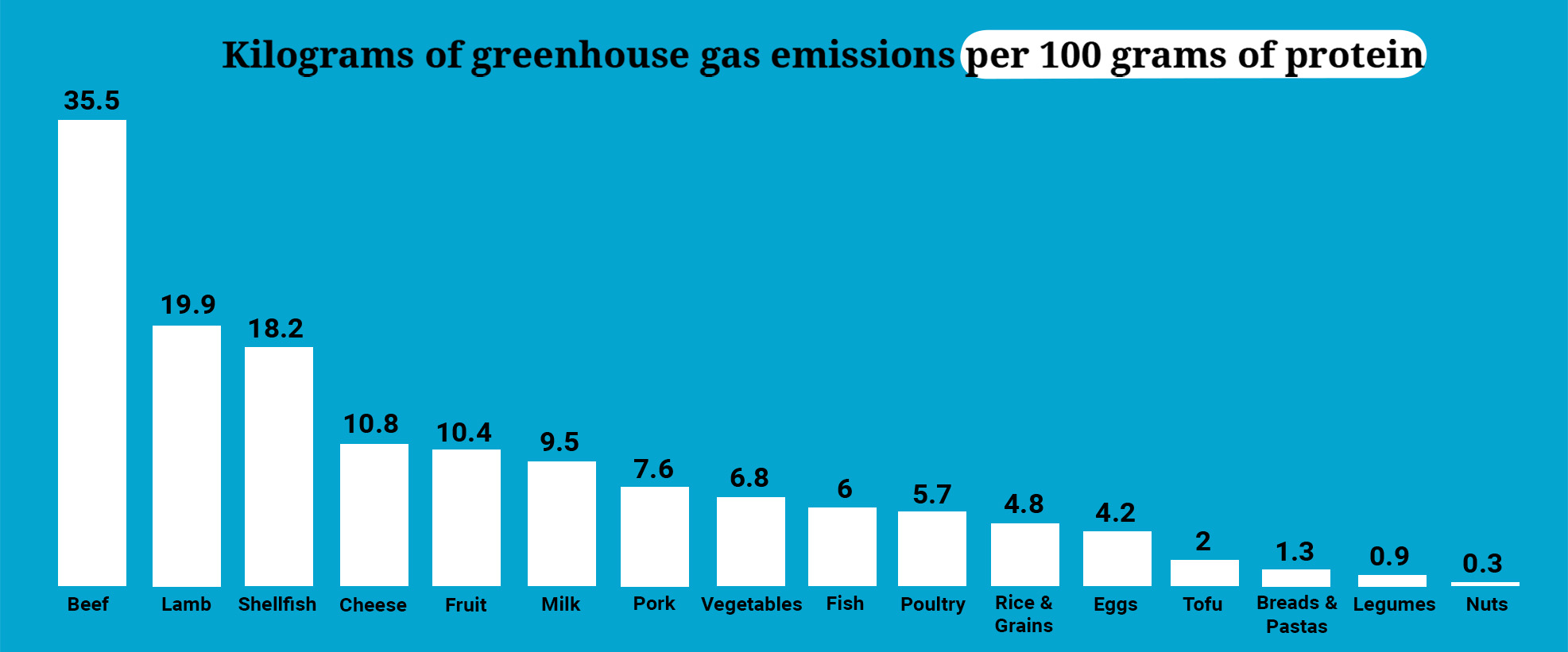United Nations Climate Action
What does food have to do with climate change?
What we eat, and how that food is produced, affects our health but also the environment.
Food needs to be grown and processed, transported, distributed, prepared, consumed, and sometimes disposed of. Each of these steps creates greenhouse gases that trap the sun’s heat and contribute to climate change. About a third of all human-caused greenhouse gas emissions is linked to food.
The largest chunk of food-related greenhouse gases comes from agriculture and land use. This includes, for instance:
- methane from cattle’s digestive process,
- nitrous oxide from fertilizers used for crop production,
- carbon dioxide from cutting down forests for the expansion of farmland,
- other agricultural emissions from manure management, rice cultivation, burning of crop residues, and the use of fuel on farms.
A much smaller share of the greenhouse gas emissions of food are caused by:
- refrigeration and transport of food,
- industrial processes such as the production of paper and aluminum for packaging,
- the management of food waste.
Which foods cause the most greenhouse gas emissions?
The climate impact of food is measured in terms of greenhouse gas emissions intensity. The emissions intensity is expressed in kilograms of “carbon dioxide equivalents” – which includes not only CO2 but all greenhouse gases – per kilogram of food, per gram of protein or per calorie.
Animal-based foods, especially red meat, dairy, and farmed shrimp, are generally associated with the highest greenhouse gas emissions. This is because:
- Meat production often requires extensive grasslands, which is often created by cutting down trees, releasing carbon dioxide stored in forests.
- Cows and sheep emit methane as they digest grass and plants.
- The cattle’s waste on pastures and chemical fertilizers used on crops for cattle feed emit nitrous oxide, another powerful greenhouse gas.
- Shrimp farms often occupy coastal lands formerly covered in mangrove forests which absorb huge amounts of carbon. The large carbon footprint of shrimp or prawns is mainly due to the stored carbon that is released into the atmosphere when mangroves are cut down to create shrimp farms.
Plant-based foods – such as fruits and vegetables, whole grains, beans, peas, nuts, and lentils – generally use less energy, land, and water, and have lower greenhouse gas intensities than animal-based foods.
Here are three charts showing the carbon footprint of different food products. Emissions can be compared based on weight (per kilogram of food), or in terms of nutritional units (per 100 grams of protein or per 1000 kilocalories) which shows us how efficiently different foods supply protein or energy.
Reducing emissions from the food sector requires changes at all stages, from producers to consumers.
Where appropriate, shifting food systems towards plant-rich diets – with more plant protein (such as beans, chickpeas, lentils, nuts, and grains), a reduced amount of animal-based foods (meat and dairy) and less saturated fats (butter, milk, cheese, meat, coconut oil and palm oil) – can lead to a significant reduction in greenhouse gas emissions compared to current dietary patterns in most industrialized countries.
Alternative proteins – such as plant-based meat and dairy substitutes, insect-based proteins, and cell-based/cultivated meat – provide promising prospects and are attracting growing demand, financial investment and technological innovation.
But animal products remain an important source of food security, nutrition, livelihoods for large numbers of rural populations around the world. Improved feeds and feeding techniques can reduce methane generated during cattle’s digestion as well as the amount of gases released by decomposing manure. Smaller herd sizes, with fewer, more productive animals can also help. And better agricultural practices, such as improved manure and fertilizer management, rotational grazing to maintain healthy soil to store carbon, and the restoration of degraded lands can significantly reduce greenhouse gas emissions.
At the same time, reducing food waste is key. Almost 1 billion tons of food – 17 percent of all food available to consumers worldwide – goes into trash bins every year. Producing, transporting, and letting that food rot contribute more than 8 percent of global greenhouse gas emissions. If food waste were a country, it would be the third-largest emitting country in the world.








.png)

